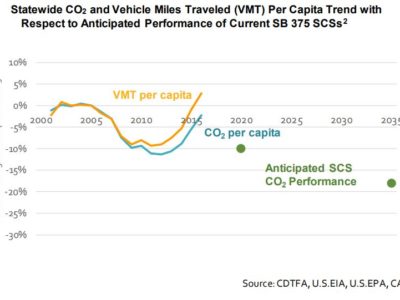Land Use
Jerry Brown’s Top Climate Accomplishments
Amazing successes, coupled with unfinished business
Today California inaugurates a new governor, Gavin Newsom, and says goodbye to four-term governor Jerry Brown. Governor Brown made climate change a central issue in his last two terms. Rick already offered an excellent assessment of the governor’s overall environmental accomplishments, so here are (to my mind) his top achievements on the specific issue of …
Continue reading “Jerry Brown’s Top Climate Accomplishments”
CONTINUE READINGAssessing–and Celebrating–California Governor Jerry Brown’s Environmental Legacy
Governor Brown Easily Ranks as the Top Environmental Governor in State History
Don’t it always seem to go That you don’t know what you’ve got `Til it’s gone –Joni Mitchell (“Big Yellow Taxi”) On this, the last day of Jerry Brown‘s tenure as California’s governor, it’s appropriate to reflect on Governor Brown’s environmental legacy. And a most formidable legacy it’s been. Brown has, quite …
Continue reading “Assessing–and Celebrating–California Governor Jerry Brown’s Environmental Legacy”
CONTINUE READINGDeveloping Policy from the Ground Up
New article provides more detailed data and analysis of housing entitlement in the Bay Area
This blog post (and the underlying article) was co-authored by Moira O’Neill, Giulia Gualco-Nelson, and Eric Biber. Our team has released a new article on land-use regulation and housing in the Bay Area, building on our report from last February that explored the role of local law and the California Environmental Quality Act (CEQA) on …
Continue reading “Developing Policy from the Ground Up”
CONTINUE READINGAuctioning the Upzone: A New Strategy for Inducing Local-Government Compliance with State Housing Policies
New White Paper by U.C. Davis Law Professors Recommends Market-Based Tool to Incentivize Intensified Urban Development in California and Beyond
(Note: the following post was co-authored by U.C. Davis School of Law Professors Chris Elmendorf and Darien Shanske; the white paper discussed in the post is their work product.) California’s housing policies–a topic that for years received precious little attention from state officials–has suddenly become the Golden State’s hottest political and policy issue. The California Legislature passed …
CONTINUE READINGWe’re Never Going to Meet Our GHG Transportation Goals Unless We Radically Rethink Our Cities
Introducing an ongoing series focused on reducing vehicle miles traveled as a crucial climate mitigation strategy
I’ve been thinking a lot lately about vehicle miles traveled, or VMT. Specifically, why is it so hard to get people to think seriously about reducing VMT as a climate mitigation strategy? Building on my earlier ode to electric scooters, this post begins a semi-regular series on different aspects of VMT reduction strategies, beginning with …
CONTINUE READINGRecommendations For Governor-Elect Newsom To Address Wildfire, Water, & Climate and Transportation Threats
New CLEE and Resources Legacy Fund report based on three expert convenings
Climate change exacerbates the droughts, floods, and wildfires that Californians now regularly experience, making them even more extreme and unpredictable. Gavin Newsom, California’s next governor, faces the urgent challenge of simultaneously preparing for inevitable disaster, improving the quality of life for residents, and minimizing the greenhouse gas emissions of a society of nearly 40 million …
CONTINUE READINGMajor Legislation Reintroduced To Limit Local Restrictions On Housing Near Transit
State Sen. Scott Wiener takes another stab at solving California’s severe housing shortage
Last year, State Senator Scott Wiener (D-San Francisco) went right to the heart of California’s massive housing shortage in its job-rich centers with SB 827, which would have limited local restrictions on housing near transit. The bill went down in committee, a victim of election year politics and diverse opposition from wealthy homeowners, tenants rights …
CONTINUE READINGFrom the Wildfire Files
Wildfires are getting worse and worse. Here’s what we know about the situation.
I don’t normally do this, but given the terrible wildfires now hitting the state, I thought it was worth doing a reprise of some posts on the subject from earlier this summer. Of course, there’s more information in the original posts, if you want to click over to them. Spreading Like Wildfire In 2017, wildfires …
Continue reading “From the Wildfire Files”
CONTINUE READINGNew Report: Improving Landscape-Level Planning for Solar PV Development
New UC Berkeley/UCLA Law report details policy changes to help achieve new SB 100 renewable energy goals
A new report from UC Berkeley and UCLA Schools of Law, A New Solar Landscape, identifies key reforms for California to enact at the state, regional, and local level to increase the pace and optimal siting of utility-scale solar photovoltaic (PV) development. With the passage of SB 100 (de León, 2018), California now requires electric …
Continue reading “New Report: Improving Landscape-Level Planning for Solar PV Development”
CONTINUE READINGWhat The 2018 Election Results Mean For California Climate Policy
Big wins for state initiatives and pro-climate candidates, plus opportunities for high speed rail and cap and trade
Some big wins for California (and therefore national) climate policy last night: Lt. Governor Gavin Newsom is elected governor, which means the state will continue its climate leadership on various policy fronts Prop. 6 loses, which would have repealed the gas tax increase and meant less funding for transit going forward Prop. 1 wins, which …
Continue reading “What The 2018 Election Results Mean For California Climate Policy”
CONTINUE READING









